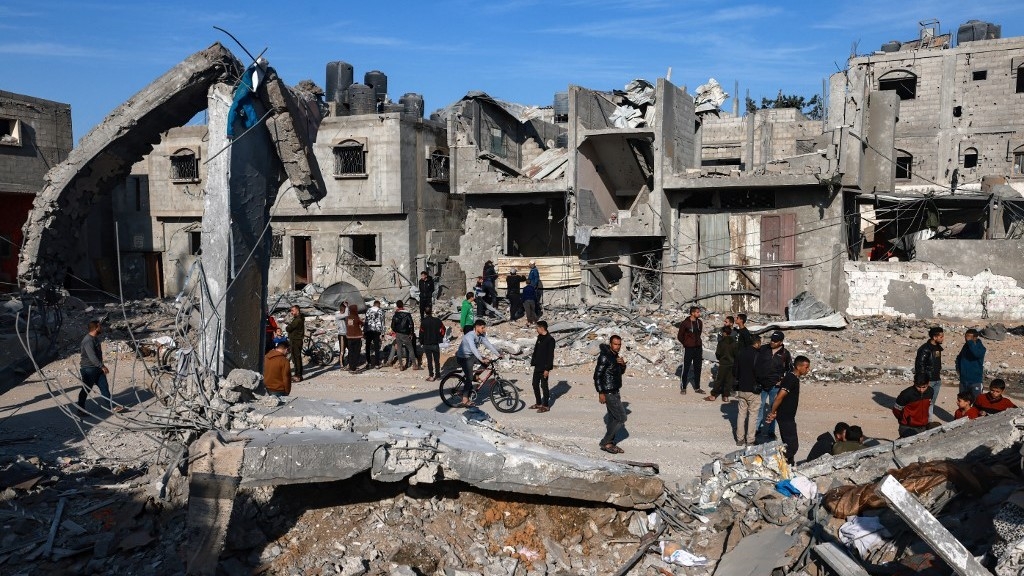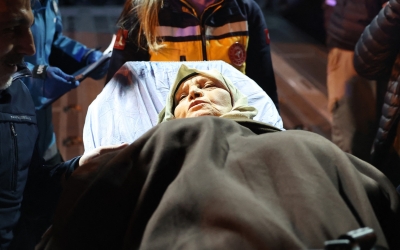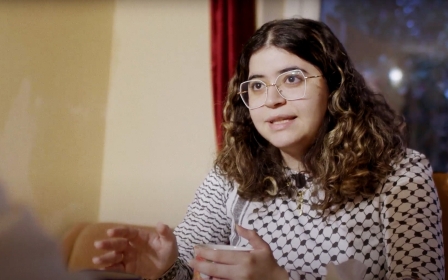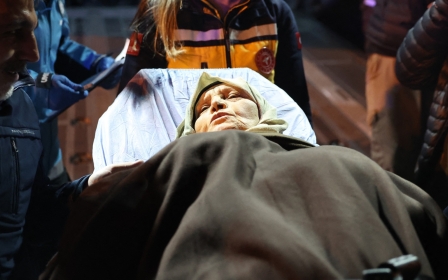Israel-Palestine war: Turkey warns Israel against targeting Hamas members within its borders

Turkey has warned Israel that targeting Hamas members within its borders will result in "serious consequences" after Israeli officials said there would be a "Munich-like" response to the 7 October attacks.
The warning comes after Ronen Bar, the head of Israel's Shin Bet domestic security service, said Hamas members living in Qatar, Lebanon and Turkey would be targeted.
"Any such attitude would have serious consequences," an intelligence source told Turkey's Anadolu Agency, adding that other countries had tried to carry out "illegal activities" on its soil in the past and that no one would be allowed to do so in the future.
The comments came as Turkish President Recep Tayyip Erdogan called Israeli Prime Minister Benjamin Netanyahu the "butcher of Gaza" in a speech on Monday, adding that "we are preparing to put him on trial".
Speaking about Israel's attacks on Gaza, Erdogan said, "The UN, which was established for global security, cannot even protect its own employees from Israeli barbarism. Israel's massacre has accelerated, I salute the resisting Gaza.
"Netanyahu, who is currently the butcher of Gaza, will be tried as the butcher of Gaza, just like Milosevic," added Erdogan referring to the former Serbian leader who was charged by an international court for war crimes in connection with the Bosnian, Croatian and Kosovo wars during the 1990s.
The comments from Erdogan came as Israeli forces continued their bombing of Gaza, while two Palestinians were also killed in raids in the occupied West Bank.
'Relentless' bombing
Palestinians woke up to total devastation on Monday, following a night of heavy Israeli air strikes targeting the east of Gaza.
Residential neighbourhoods including the Al-Zaytoun and Al-Shujaiya were left in ruins, in attacks that killed at least 30 Palestinians.
The Palestinian Ministry of Health also announced that the death toll, since the start of the war on 7 October, has now reached 15,899, with 70 percent of that figure being women and children.
The bombing continued while Paltel, one of Gaza’s main telecommunication companies, announced that all telecom services in Gaza City and North Gaza were down due to the disconnection in their network caused by the aggression.
On the ground, the humanitarian situation is also worsening.
The United Nations agency for Palestinian refugees, Unrwa, said on Monday that almost 1.9 million people - 80 percent of the population - have been displaced in Gaza since the war started.
Health officials in Gaza say that there are now 42,000 wounded people in Gaza since 7 October, with health facilities unable to cater to their needs or provide treatment for them.
A number of international organisations have shed light on the dire situation in Gaza currently.
Unicef spokesman James Elder, who is in the southern Gaza city of Khan Younis, described a “night of utterly relentless bombardments” in a voice note posted to X.
“I cannot stop thinking about the 1.8 million people here in the south,” he said.
The United Nations agency Unrwa also reiterated that “no place is safe anywhere in Gaza”, while the World Health Organisation said they will hold an emergency meeting on 10 December with the Palestinian envoy who is seeking improved medical access to Gaza.
Cancer patients without treatment
The war has also had an impact on cancer patients in Gaza.
A patient in Gaza told Middle East Eye that he can no longer get hold of medicine, consequently his pain is unbearable and his condition has worsened.
"Due to the deterioration of my health, I need to be reviewed at the hospital in the West Bank once or twice a month… my nervous system has begun to completely deteriorate, leading to severe pain in the nerves in my eyes and throughout my body,” Ahmed al-Yaqoubi told Middle East Eye.
Dr Sobhi Sukeyk, the director of Gaza's Turkish-Palestinian Friendship Hospital, says that the hospital no longer functions following more than seven weeks of intense Israeli bombing on the besieged enclave.
“On November 2, the hospital staff and patients were forced to evacuate due to the complete depletion of fuel, making the operation of devices for preparing medicines for cancer patients impossible, and [leading to] the cessation of the water and sanitation systems,” he told Middle East Eye.
Muslim leaders in US launch 2024 'Abandon Biden' campaign
Muslim leaders, organisers and community members from several US states have launched a national campaign against the reelection of President Joe Biden over his stalwart support of Israel's military campaign in Gaza, which many scholars have warned could amount to genocide against Palestinians.
In a press conference on Saturday in Dearborn, Michigan, Muslim organisers from Arizona, Florida, Georgia, Minnesota, Nevada, and Pennsylvania came together to announce a coordinated nationwide effort to ensure Biden does not secure a second term in office.
“We are not powerless as American Muslims. We are powerful. We don’t only have the money, but we have the actual votes. And we will use that vote to save this nation from itself,” Jaylani Hussein, a member of the coalition, said at the press conference.
While it is unclear how much traction the campaign will get, organisers are confident that they can put together a significant bloc of Muslim voters, which could sway the election.
According to the most recent data from the Pew Research Center, the Muslim American population is roughly 3.45 million people.
Many swing states - states that have had inconsistent voting patterns in previous elections - contain large pockets of both Muslim-American and Arab- American voting blocks.
For example, in the 2020 election, Biden won the state of Michigan by 150,000 votes. There is an estimated 206,050 registered Muslim voters in the state as of 2020.
"We want to make sure we get Muslims to vote, ensure the voter turnout is high, that we organise and mobilise as well as continue our protests around the 'Abandon Biden' theme," Abdel Salam said.
Middle East Eye propose une couverture et une analyse indépendantes et incomparables du Moyen-Orient, de l’Afrique du Nord et d’autres régions du monde. Pour en savoir plus sur la reprise de ce contenu et les frais qui s’appliquent, veuillez remplir ce formulaire [en anglais]. Pour en savoir plus sur MEE, cliquez ici [en anglais].





